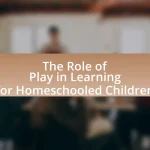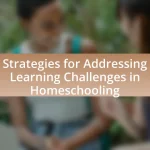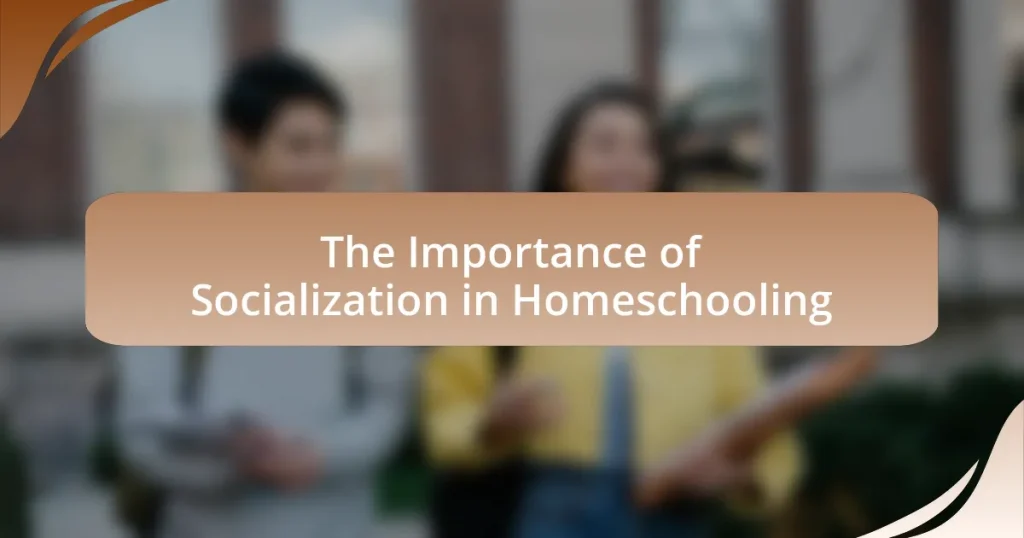The article focuses on the importance of socialization in homeschooling, emphasizing its role in developing interpersonal skills, emotional intelligence, and a sense of community among homeschooled children. It highlights research findings that show homeschooled children actively participate in social activities, such as sports and community events, which contribute to their social competence. The article addresses common misconceptions about socialization in homeschooling, compares socialization experiences between homeschooled and traditionally schooled children, and outlines strategies for parents to enhance their children’s social interactions. Additionally, it discusses the benefits of socialization for emotional development and academic success, while also identifying challenges and best practices for fostering effective socialization in a homeschooling environment.
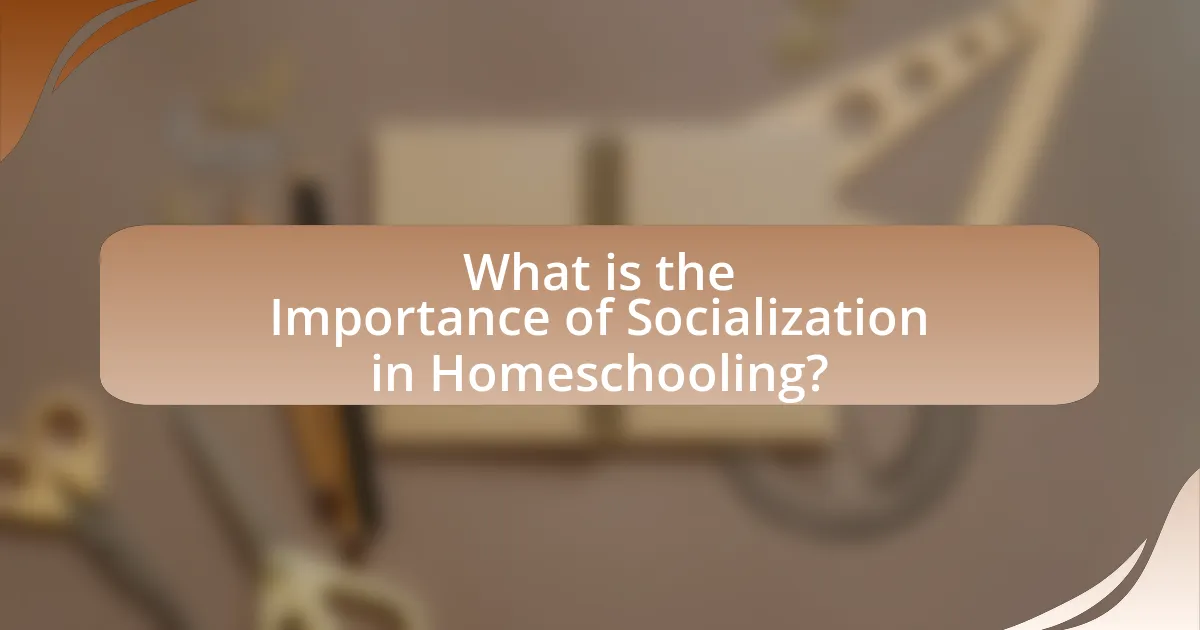
What is the Importance of Socialization in Homeschooling?
Socialization in homeschooling is crucial as it helps children develop interpersonal skills, emotional intelligence, and a sense of community. Engaging with peers and adults outside the home environment fosters communication skills and adaptability, which are essential for future success. Research indicates that homeschooled children often participate in various social activities, such as sports, clubs, and community events, which provide opportunities for interaction and relationship-building. A study by the National Center for Education Statistics found that 85% of homeschooled students engage in extracurricular activities, highlighting the importance of socialization in their overall development.
Why is socialization a critical aspect of homeschooling?
Socialization is a critical aspect of homeschooling because it ensures that homeschooled children develop essential interpersonal skills and emotional intelligence. Engaging with peers and adults outside the family unit fosters communication, cooperation, and conflict resolution abilities, which are vital for success in society. Research indicates that children who are homeschooled can achieve social competence comparable to their traditionally schooled peers when provided with adequate social opportunities, such as extracurricular activities, community involvement, and cooperative learning groups. This evidence underscores the importance of intentional socialization efforts in homeschooling to promote well-rounded development.
What are the common misconceptions about socialization in homeschooling?
Common misconceptions about socialization in homeschooling include the belief that homeschooled children lack social skills and do not interact with peers. In reality, research indicates that homeschooled children often engage in diverse social activities, such as community sports, co-ops, and extracurricular programs, which provide ample opportunities for social interaction. A study by the National Center for Education Statistics found that homeschooled students participate in social activities at rates comparable to their traditionally schooled peers, debunking the myth that homeschooling leads to social isolation.
How does socialization differ in homeschooling compared to traditional schooling?
Socialization in homeschooling differs from traditional schooling primarily in the context and variety of social interactions. In traditional schooling, students engage with a diverse group of peers daily, fostering social skills through structured environments and group activities. Conversely, homeschooling often relies on family and community-based interactions, which can limit exposure to a broader peer group but may encourage deeper relationships within smaller circles. Research indicates that homeschooled children often participate in extracurricular activities, co-ops, and community events, which can provide socialization opportunities, albeit in different settings than those found in traditional schools. Studies show that homeschooled children can develop strong social skills, but the nature of their socialization experiences varies significantly from those in conventional educational settings.
What are the key benefits of socialization for homeschooled children?
Socialization for homeschooled children provides essential benefits, including improved communication skills, enhanced emotional intelligence, and increased adaptability in diverse social settings. These children often engage in various group activities, such as co-ops, sports, and community events, which facilitate interactions with peers and adults alike. Research indicates that homeschooled children frequently develop strong interpersonal skills due to their participation in these social environments, allowing them to navigate social situations effectively. Additionally, studies show that homeschooled children often exhibit higher levels of confidence and self-esteem, attributed to their ability to form meaningful relationships outside traditional school settings.
How does socialization contribute to emotional development?
Socialization significantly contributes to emotional development by providing individuals with opportunities to interact, communicate, and form relationships with others. Through these interactions, individuals learn to recognize and express their emotions, develop empathy, and understand social norms. Research indicates that children who engage in social activities exhibit better emotional regulation and are more adept at forming secure attachments, which are crucial for healthy emotional growth. For instance, a study published in the Journal of Child Psychology and Psychiatry found that children with strong social skills are less likely to experience anxiety and depression, highlighting the direct link between socialization and emotional well-being.
What role does socialization play in academic success for homeschooled children?
Socialization plays a crucial role in the academic success of homeschooled children by enhancing their communication skills, emotional intelligence, and ability to collaborate with peers. Engaging in social activities allows these children to develop essential interpersonal skills that contribute to a positive learning environment. Research indicates that homeschooled children who participate in group activities, such as co-ops or extracurriculars, often demonstrate higher academic performance due to improved motivation and engagement. A study by the National Center for Education Statistics found that social interactions positively correlate with academic achievement, highlighting the importance of socialization in fostering a well-rounded educational experience for homeschooled children.
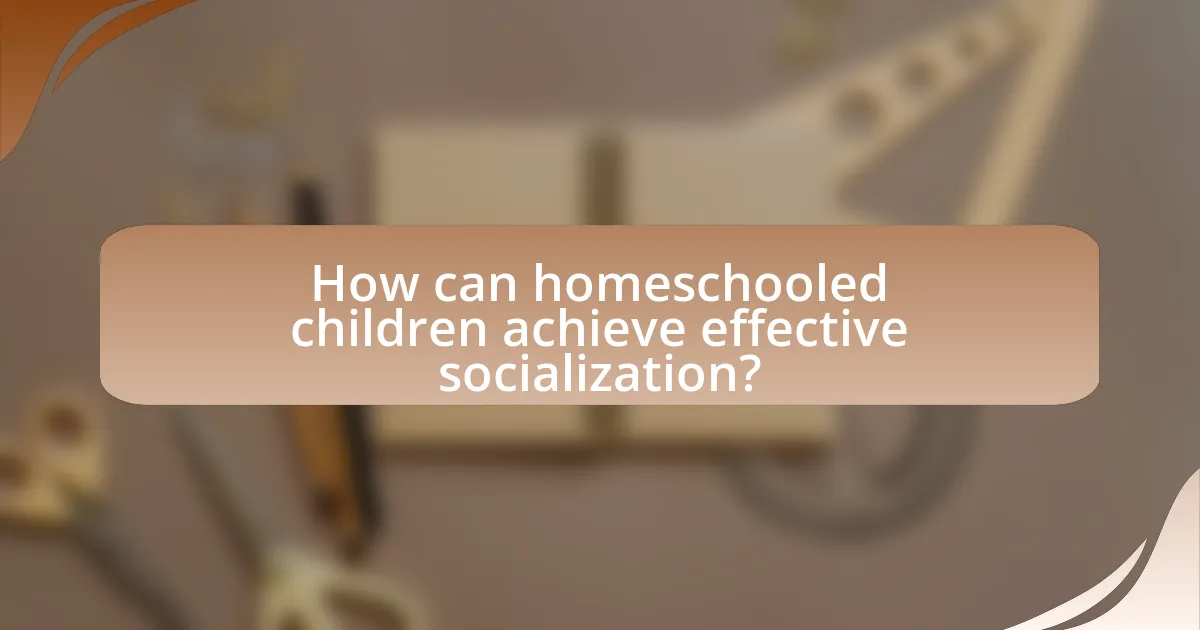
How can homeschooled children achieve effective socialization?
Homeschooled children can achieve effective socialization by engaging in community activities, joining homeschooling groups, and participating in extracurricular programs. These avenues provide opportunities for interaction with peers, fostering social skills and friendships. Research indicates that homeschooled children often participate in organized sports, clubs, and community service, which enhances their social development. A study published in the Journal of School Choice found that homeschooled children who engage in group activities exhibit social skills comparable to those of traditionally schooled peers, demonstrating that structured social interactions are crucial for their socialization.
What activities promote socialization among homeschooled children?
Activities that promote socialization among homeschooled children include group classes, sports teams, co-ops, and community service projects. Group classes, such as art or music, provide opportunities for children to interact with peers while learning collaboratively. Sports teams encourage teamwork and physical activity, fostering friendships through shared goals. Homeschool co-ops allow families to come together for educational activities, enhancing social skills through cooperative learning. Community service projects engage children in meaningful interactions with diverse groups, promoting empathy and social responsibility. These activities are supported by research indicating that social interactions are crucial for emotional and social development in children.
How do community groups and co-ops facilitate social interaction?
Community groups and co-ops facilitate social interaction by providing structured environments where individuals can engage in shared activities and collaborate on common interests. These organizations often host events, workshops, and meetings that encourage participation and foster relationships among members. For instance, research indicates that participation in community groups enhances social networks, leading to increased feelings of belonging and support. A study published in the Journal of Community Psychology found that individuals involved in community organizations reported higher levels of social capital, which is essential for effective social interaction.
What extracurricular activities are beneficial for socialization?
Extracurricular activities that are beneficial for socialization include team sports, drama clubs, music bands, and community service projects. Team sports, such as soccer or basketball, foster teamwork and communication skills among participants, while drama clubs encourage collaboration and self-expression through performance. Music bands provide opportunities for individuals to work together towards a common goal, enhancing social bonds. Community service projects allow participants to engage with diverse groups, promoting empathy and social awareness. Research indicates that involvement in these activities significantly enhances social skills and emotional intelligence, which are crucial for effective interpersonal interactions.
How can parents support their children’s socialization efforts?
Parents can support their children’s socialization efforts by facilitating opportunities for interaction with peers through organized activities and community involvement. Engaging in group sports, clubs, or classes allows children to develop social skills and build friendships. Research indicates that children who participate in social activities exhibit improved communication skills and emotional intelligence, which are crucial for effective socialization. For instance, a study published in the Journal of Educational Psychology found that children involved in extracurricular activities are more likely to form positive peer relationships and demonstrate higher levels of social competence.
What strategies can parents use to encourage social interactions?
Parents can encourage social interactions by facilitating playdates and group activities. Organizing regular playdates allows children to engage with peers in a familiar environment, fostering friendships and social skills. Additionally, enrolling children in extracurricular activities, such as sports teams or art classes, provides structured opportunities for socialization with diverse groups. Research indicates that children who participate in group activities develop better communication skills and emotional intelligence, which are crucial for effective social interactions. Furthermore, parents can model social behaviors by demonstrating positive interactions with others, reinforcing the importance of communication and cooperation.
How can parents assess their children’s social needs?
Parents can assess their children’s social needs by observing their interactions with peers and evaluating their comfort levels in social situations. Regularly engaging in playdates, group activities, and community events allows parents to gauge their children’s social skills, such as communication, empathy, and conflict resolution. Research indicates that children who participate in diverse social settings develop better social competencies, which are crucial for their overall development. For instance, a study published in the Journal of Educational Psychology found that children with strong social skills tend to perform better academically and have healthier relationships. By monitoring these interactions and seeking feedback from educators or other parents, parents can effectively identify and address their children’s social needs.
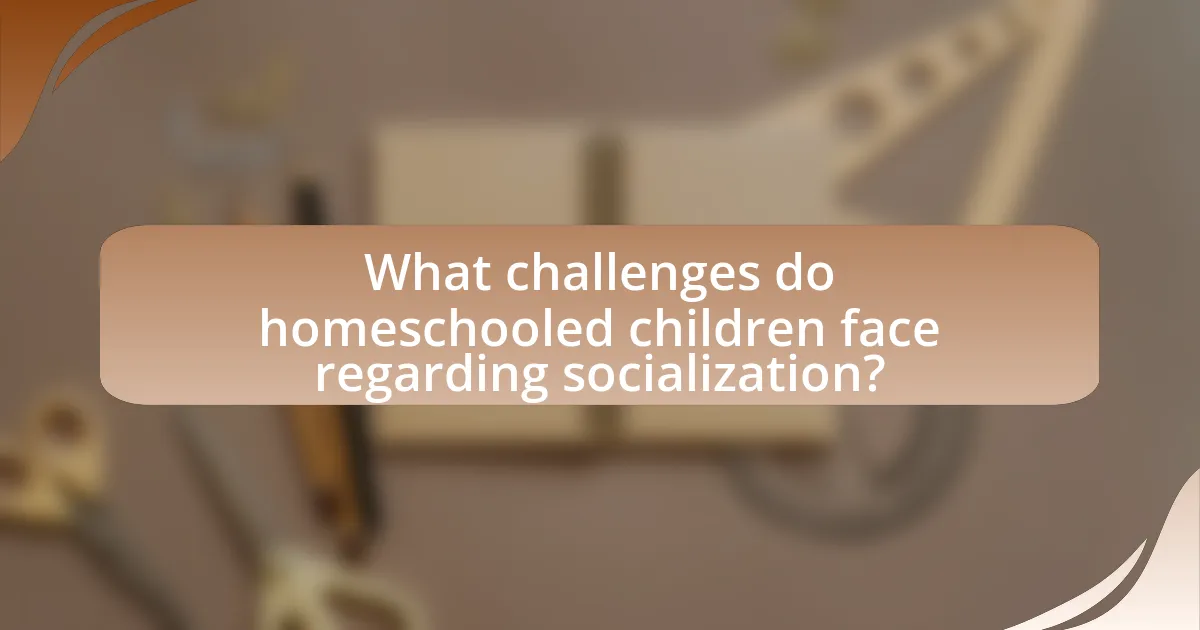
What challenges do homeschooled children face regarding socialization?
Homeschooled children often face challenges in socialization due to limited interaction with peers. This lack of regular, structured social environments, such as traditional schools, can lead to difficulties in developing social skills, forming friendships, and experiencing diverse social situations. Research indicates that homeschooled children may have fewer opportunities for spontaneous social interactions, which are crucial for learning social cues and behaviors. A study published in the Journal of School Choice found that homeschooled children reported feeling isolated and had fewer close friends compared to their traditionally schooled counterparts.
What are the potential drawbacks of limited socialization in homeschooling?
Limited socialization in homeschooling can lead to social skill deficits in children. Research indicates that children who lack regular interaction with peers may struggle with communication, conflict resolution, and emotional regulation. A study published in the Journal of School Psychology found that homeschooled children often exhibit lower levels of social competence compared to their traditionally schooled peers, which can impact their ability to form relationships and adapt to social environments later in life. Additionally, limited socialization opportunities can result in feelings of isolation and loneliness, further affecting mental health and overall well-being.
How can isolation impact a child’s social skills?
Isolation can significantly hinder a child’s social skills development. When children are isolated, they miss out on essential interactions that teach them how to communicate, empathize, and collaborate with peers. Research indicates that children who experience prolonged isolation may struggle with understanding social cues and developing friendships, leading to difficulties in forming relationships later in life. For instance, a study published in the journal “Child Development” found that children with limited social interactions exhibited lower levels of social competence and higher levels of anxiety in social situations. This evidence underscores the critical role of socialization in fostering healthy social skills in children.
What signs indicate a need for increased socialization opportunities?
Signs indicating a need for increased socialization opportunities include withdrawal from social interactions, difficulty in making friends, and a lack of interest in group activities. These behaviors suggest that an individual may not be engaging sufficiently with peers, which can hinder social skill development. Research shows that children who lack socialization opportunities may experience increased feelings of loneliness and anxiety, impacting their overall well-being. For instance, a study published in the Journal of Child Psychology and Psychiatry found that children with limited social interactions are more likely to exhibit behavioral issues and emotional distress.
How can families overcome socialization challenges in homeschooling?
Families can overcome socialization challenges in homeschooling by actively engaging in community activities and forming support networks. Participating in local homeschooling groups, sports teams, and extracurricular classes allows children to interact with peers, fostering social skills and friendships. Research indicates that homeschooled children who engage in regular social activities report higher levels of social competence and confidence. For instance, a study published in the Journal of School Choice found that homeschooled students involved in community activities exhibited similar social skills to their traditionally schooled counterparts. By prioritizing these interactions, families can effectively address socialization challenges.
What resources are available for enhancing socialization in homeschooling?
Resources available for enhancing socialization in homeschooling include local homeschooling co-ops, online forums, extracurricular activities, and community classes. Local homeschooling co-ops provide opportunities for children to interact with peers through group learning experiences, while online forums connect families for support and social interaction. Extracurricular activities, such as sports teams or arts programs, allow homeschooled children to engage with others in shared interests. Community classes, often offered by libraries or community centers, provide additional avenues for social engagement. Research indicates that participation in these activities can significantly improve social skills and peer relationships among homeschooled children.
How can networking with other homeschooling families help?
Networking with other homeschooling families can significantly enhance educational experiences and social development. By connecting with peers, families can share resources, teaching strategies, and curriculum ideas, which can lead to improved educational outcomes. Research indicates that social interactions among homeschooling families foster a sense of community, reducing feelings of isolation and providing emotional support. Additionally, participating in group activities and co-ops allows children to develop social skills and friendships, which are crucial for their overall development. Studies show that children who engage in social activities with peers exhibit better communication skills and emotional intelligence, reinforcing the importance of networking in the homeschooling environment.
What are some best practices for ensuring effective socialization in homeschooling?
To ensure effective socialization in homeschooling, families should actively engage their children in diverse social activities. This can include joining local homeschooling groups, participating in community sports, and enrolling in extracurricular classes, which provide opportunities for interaction with peers. Research indicates that children who engage in regular social activities develop better social skills and emotional intelligence, as highlighted in a study by the National Center for Education Statistics, which found that homeschooled children often participate in community activities at rates comparable to their traditionally schooled peers. Additionally, arranging playdates and cooperative learning experiences with other homeschooling families fosters friendships and collaborative skills, further enhancing social development.
How can parents create a balanced socialization plan for their children?
Parents can create a balanced socialization plan for their children by incorporating a variety of social activities that promote interaction with peers, adults, and diverse groups. This can include enrolling children in extracurricular activities such as sports, music classes, or art programs, which provide opportunities for teamwork and collaboration. Additionally, parents should facilitate playdates and group outings with other homeschooling families to foster friendships and social skills. Research indicates that children who engage in diverse social settings develop better communication skills and emotional intelligence, which are crucial for their overall development. By ensuring a mix of structured and unstructured social experiences, parents can effectively support their children’s social growth while homeschooling.
What tips can help homeschooled children develop strong social skills?
To help homeschooled children develop strong social skills, parents should encourage participation in group activities such as sports, clubs, or community service. Engaging in these activities allows children to interact with peers, practice communication, and develop teamwork skills. Research indicates that social interactions in diverse settings enhance emotional intelligence and adaptability, which are crucial for effective socialization. Additionally, arranging playdates or study groups with other homeschooled children fosters a sense of community and provides opportunities for social learning.

